Shuba
Same narration found in Ibn Majah 1944, and Abu Dawood 2062
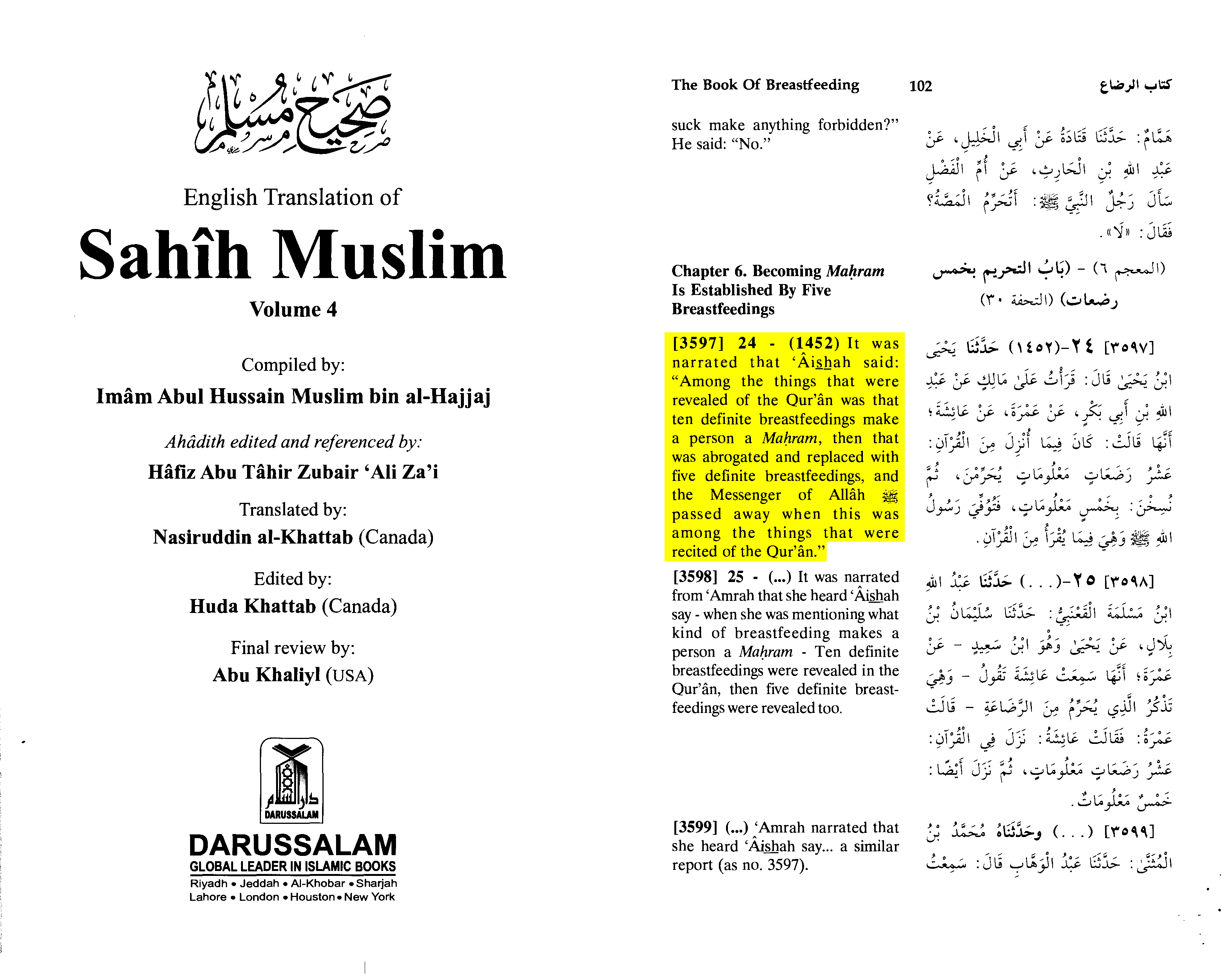 Shaykh Abd al-Aziz al-Rajihi says:
Some of the people used to the 5 suckling (verses) and they were never informed of its abrogation,
when it was told to them they retracted from reciting and agreed in consensus that it should not be recited,
and this is the abrogation of recitation without the ruling (ruling remains) it is from one of the forms of
abrogation.
Shaykh Abd al-Aziz al-Rajihi says:
Some of the people used to the 5 suckling (verses) and they were never informed of its abrogation,
when it was told to them they retracted from reciting and agreed in consensus that it should not be recited,
and this is the abrogation of recitation without the ruling (ruling remains) it is from one of the forms of
abrogation.
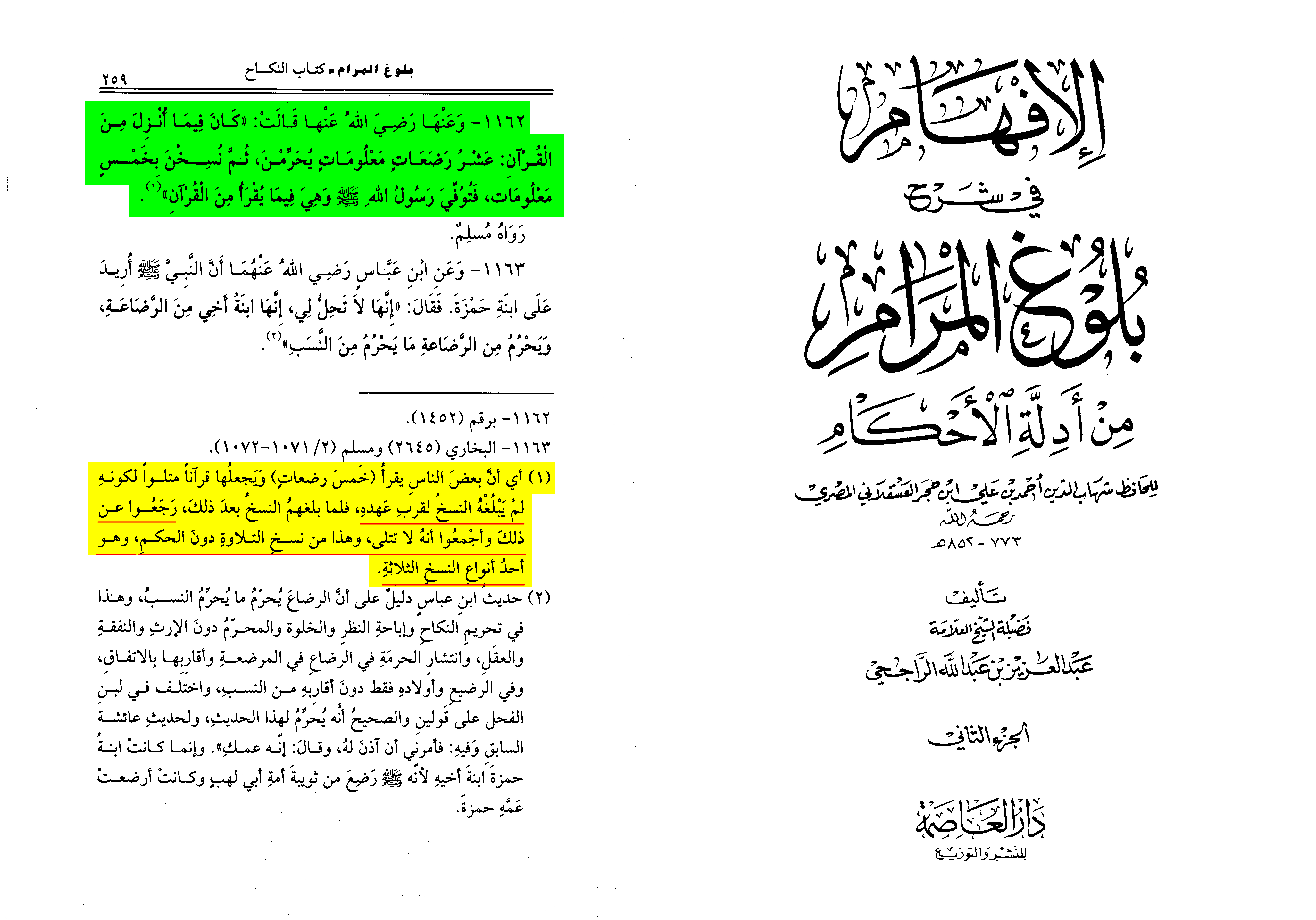 al-Hafidh al-Nawawi essentially says the same thing. He says the three forms of abrogation are
1) Recition abrogated without the ruling
2) ruling abrogation without the recitation
3) Both recitation and ruling are abrogated
He says the suckling verses fall under # 3 and the stoning verse falls under #1
al-Hafidh al-Nawawi essentially says the same thing. He says the three forms of abrogation are
1) Recition abrogated without the ruling
2) ruling abrogation without the recitation
3) Both recitation and ruling are abrogated
He says the suckling verses fall under # 3 and the stoning verse falls under #1
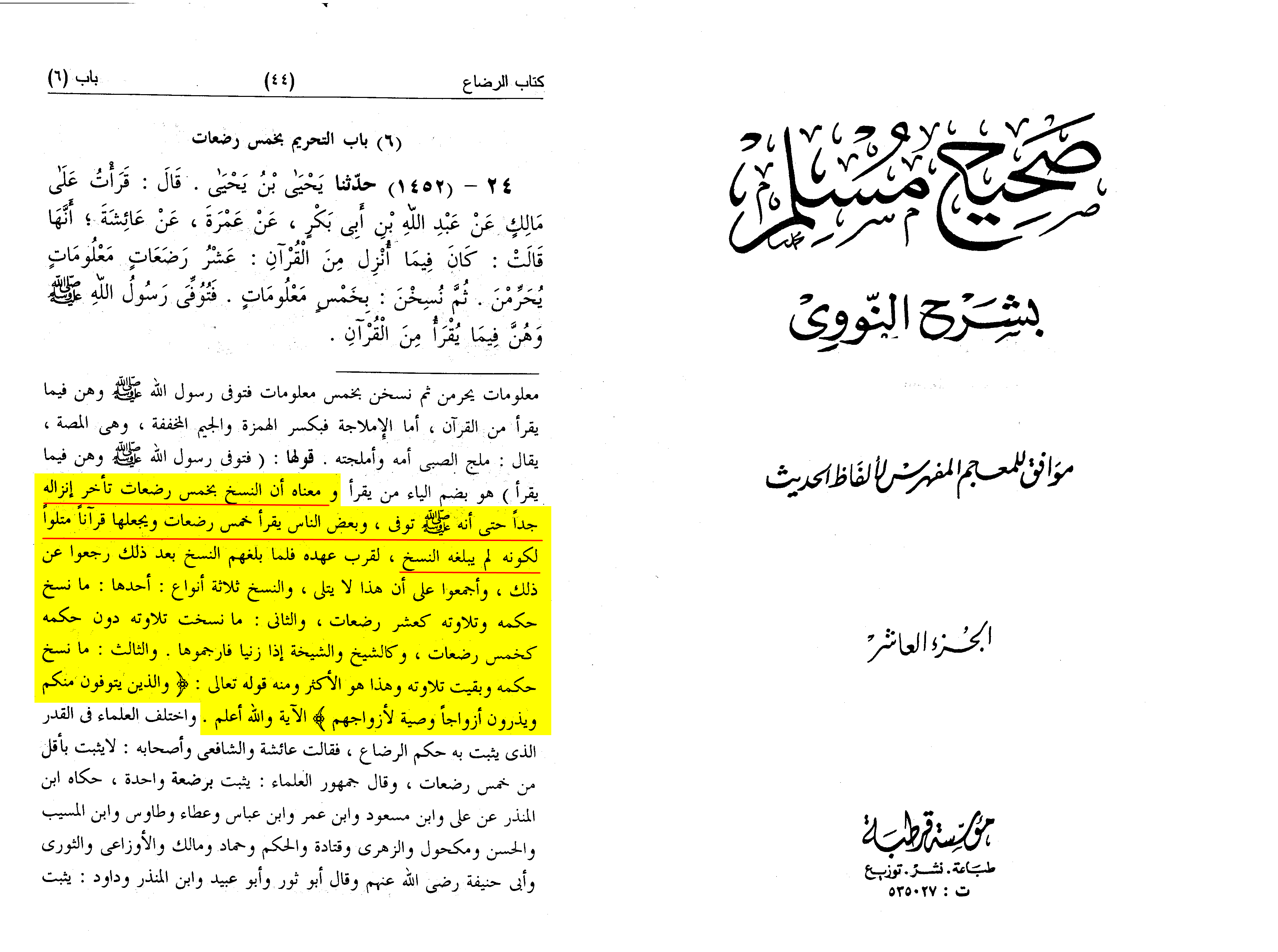 "As for the statement {5 known ones (breastfeedings)]... and {And it was from what was recited [of the Qur'ān]},
if taken upon its apparent would suggest the Qur'ān is corrupted, so the explanation for it is that its recitation
was also abrogated but this happened near his death, ﷺ, so some of the people still recited it until after he passed
away, ﷺ, and then they stopped reciting it after [news of its abrogation] reached them. So it is clear that both
recitations have been abrogated, with some difference of opinion over the ruling of 5 breastfeedings remaining,
with the majority saying otherwise since
that which is abrogated is not to be used as evidence as it is not from the Qur'ān, nor Sunnah, scholarly consensus
or qiyās..."
"As for the statement {5 known ones (breastfeedings)]... and {And it was from what was recited [of the Qur'ān]},
if taken upon its apparent would suggest the Qur'ān is corrupted, so the explanation for it is that its recitation
was also abrogated but this happened near his death, ﷺ, so some of the people still recited it until after he passed
away, ﷺ, and then they stopped reciting it after [news of its abrogation] reached them. So it is clear that both
recitations have been abrogated, with some difference of opinion over the ruling of 5 breastfeedings remaining,
with the majority saying otherwise since
that which is abrogated is not to be used as evidence as it is not from the Qur'ān, nor Sunnah, scholarly consensus
or qiyās..."
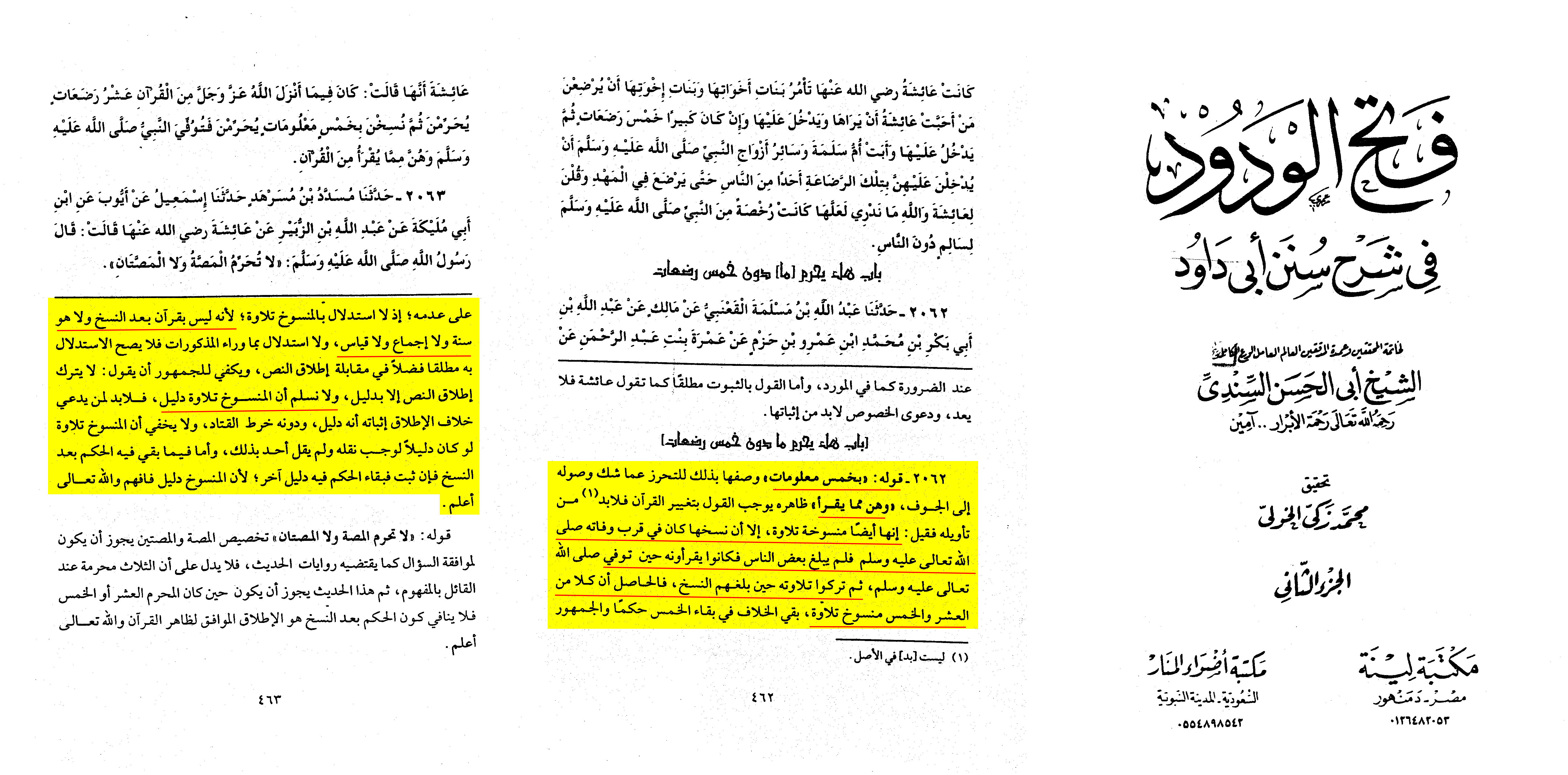 "The explanation of this is that it was recited by some people as they were not aware of its abrogation...
al-Tawrabishtī said:
It is not correct to say that its recitation still remained [as part of the Qur'ān] and then it was abandoned
since Allāh has protected this book from any form of corruption due to the verse (Qur'ān 15:9). It is not possible
for Allāh's Book to be missing a verse, or even a letter, from the time of the Message except that it was abrogated."
"The explanation of this is that it was recited by some people as they were not aware of its abrogation...
al-Tawrabishtī said:
It is not correct to say that its recitation still remained [as part of the Qur'ān] and then it was abandoned
since Allāh has protected this book from any form of corruption due to the verse (Qur'ān 15:9). It is not possible
for Allāh's Book to be missing a verse, or even a letter, from the time of the Message except that it was abrogated."
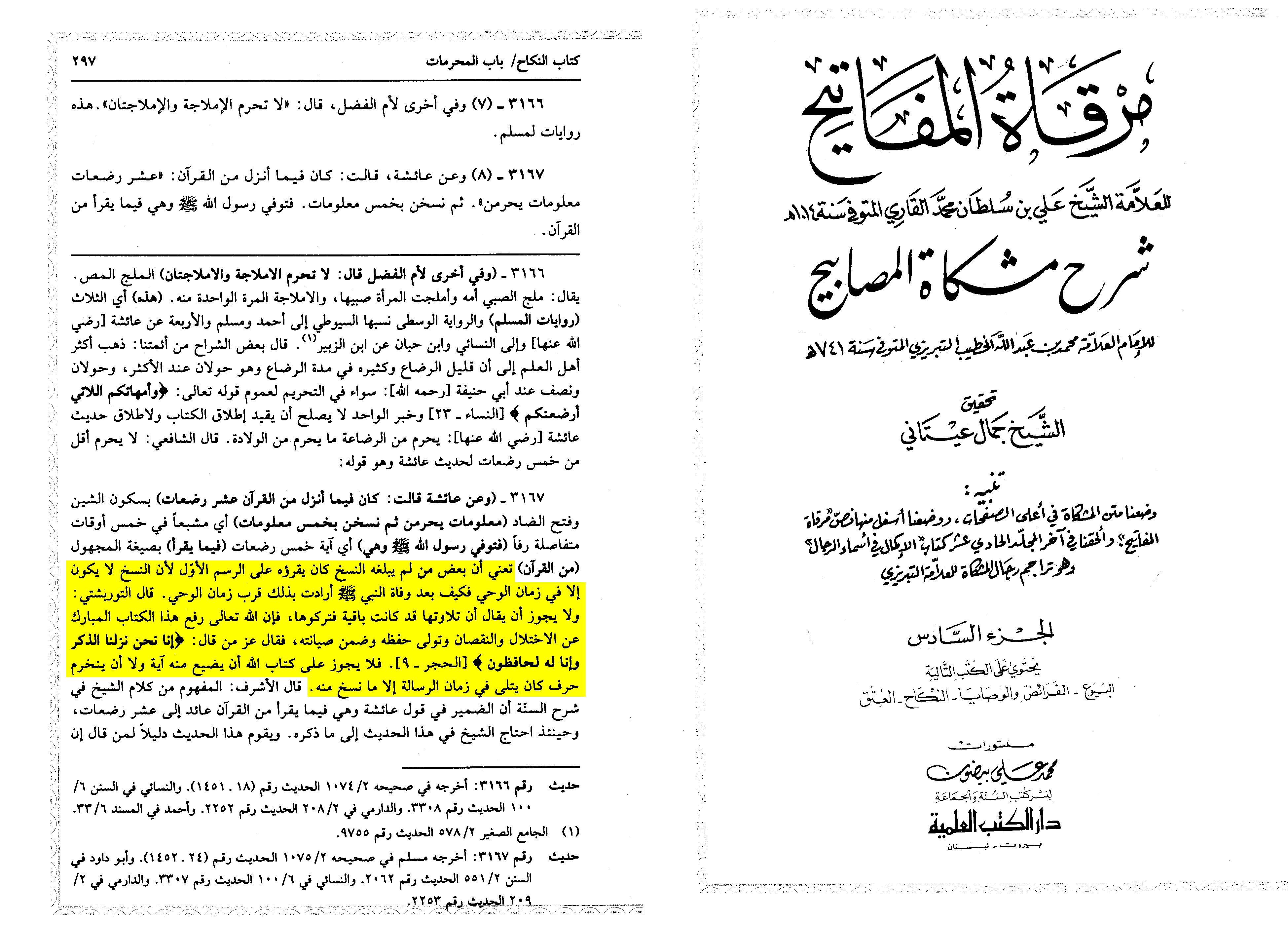 "In the Hadīth there is evidence that there are two types of abrogation, in ruling and recitation,
and in just recitation and not ruling. As for abrogation in ruling and recitation, then that is shown in the statement of
'Ā'ishah {10 breastfeedings making marriage prohibited was part of what was revealed in the Qur'ān}. The [ruling] of 10 breastfeedings
was abrogated in recitation and ruling. As for abrogation in recitation without ruling, then that is in her statement {Then it was abrogated by 5}.
So this statement was abrogated in recitation, and many of the scholars affirmed
[the validity] of the ruling, such as ash-Shāfi'ī, and it is one of the statements of Imām Ahmad and what his companions acted upon.
And so the verse is abrogated, but the ruling remains, and that is [the] correct [view], God-willing....
Abū Bakr al Bāqillānī said:
"The people knew that these words and recitations that were not included in the Mushaf of 'Uthmān were abrogated..."
And some scholars saw the statement of 'Ā'ishah as problematic... while in reality, it is not so. The scholars
have the following opinions regarding it:
1) That it was from what was recited of the Qur'ān close to his death, ﷺ
2) The ruling was what was "recited" (or mentioned) without its wording [being present in the Qur'ān]
3) Its recitation was abrogated, and not everyone from among the people knew of this until after the death of Allāh's
Messenger ﷺ, and so he ﷺ died and some still recited it
4) That what was recited is in reference to the verse (Qur'ān 4:22)
And there is no doubt that the most correct view is the third, and God knows best. With this settled, then there is no
problem in the meaning of the Hadīth, and to Allāh belongs all praise...
And it has been narrated in some chains with of the Hadīth with an odd, weak wording which came from Ibn Ishāq
[Sunan Ibn Mājah 1944, Musnad Ahmad 26316)"
"In the Hadīth there is evidence that there are two types of abrogation, in ruling and recitation,
and in just recitation and not ruling. As for abrogation in ruling and recitation, then that is shown in the statement of
'Ā'ishah {10 breastfeedings making marriage prohibited was part of what was revealed in the Qur'ān}. The [ruling] of 10 breastfeedings
was abrogated in recitation and ruling. As for abrogation in recitation without ruling, then that is in her statement {Then it was abrogated by 5}.
So this statement was abrogated in recitation, and many of the scholars affirmed
[the validity] of the ruling, such as ash-Shāfi'ī, and it is one of the statements of Imām Ahmad and what his companions acted upon.
And so the verse is abrogated, but the ruling remains, and that is [the] correct [view], God-willing....
Abū Bakr al Bāqillānī said:
"The people knew that these words and recitations that were not included in the Mushaf of 'Uthmān were abrogated..."
And some scholars saw the statement of 'Ā'ishah as problematic... while in reality, it is not so. The scholars
have the following opinions regarding it:
1) That it was from what was recited of the Qur'ān close to his death, ﷺ
2) The ruling was what was "recited" (or mentioned) without its wording [being present in the Qur'ān]
3) Its recitation was abrogated, and not everyone from among the people knew of this until after the death of Allāh's
Messenger ﷺ, and so he ﷺ died and some still recited it
4) That what was recited is in reference to the verse (Qur'ān 4:22)
And there is no doubt that the most correct view is the third, and God knows best. With this settled, then there is no
problem in the meaning of the Hadīth, and to Allāh belongs all praise...
And it has been narrated in some chains with of the Hadīth with an odd, weak wording which came from Ibn Ishāq
[Sunan Ibn Mājah 1944, Musnad Ahmad 26316)"
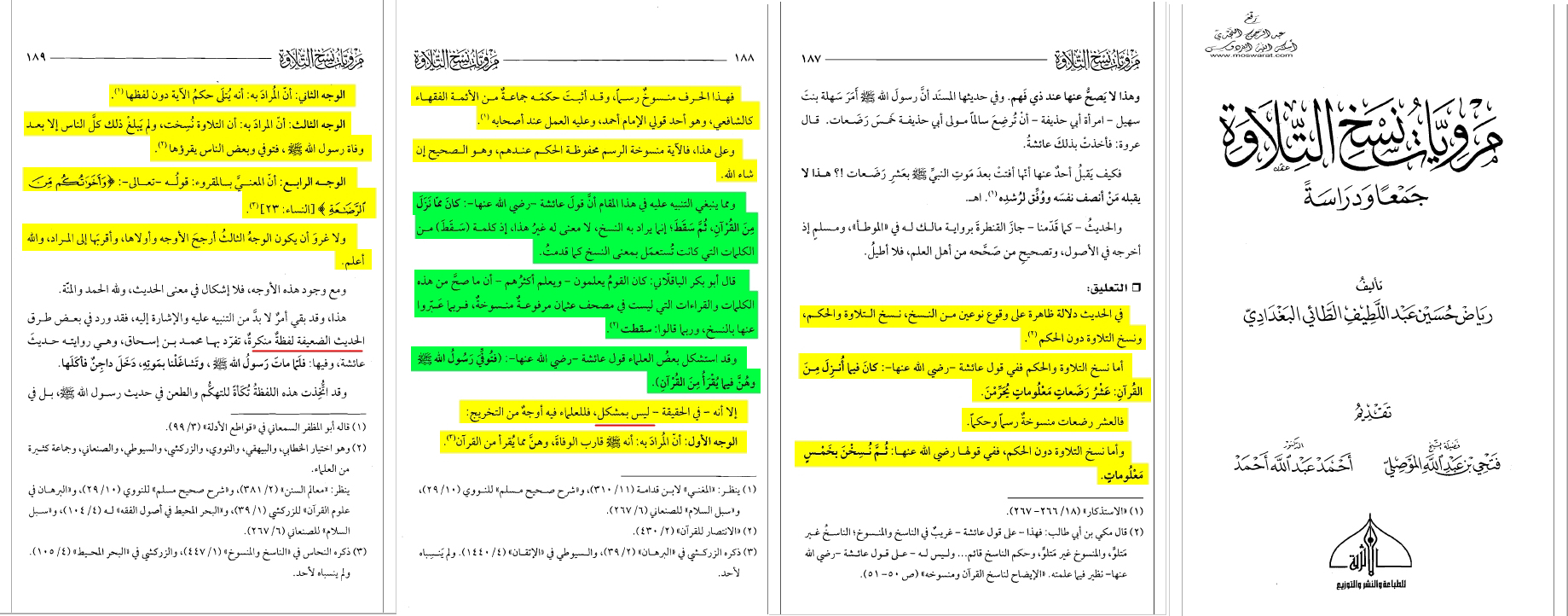 "As for the statement {And it was from what was recited from the Qur'ān}... some atheists and ignorant Rawāfidh
have taken it upon its apparent and attacked the Qur'ān and said that it is missing some verses and chapters,
and we seek refuge in Allāh the Most High and Great [from such]... and the reality is that this slander of these
disbelievers against the Qur'ān by using this Hadīth is based upon ignorance.
The Ummah have agreed that the wording {Five breastfeedings} is not from the Qur'ān and that it is not permitted
for anyone to recite that like the Qur'ān or to write it down in the Masāhif, this agreement having not been opposed
by anyone. As for 'Ā'ishah's statement {When Allāh's Messenger ﷺ died it was from what was recited from the Qur'ān},
many of the scholars of Hadīth weakened this part and didn't accept it, and there were some who accepted it and explained it.
From those who weakened this part of the Hadīth was Imām Abū Ja'far al-Tahāwī who stated in "Mushkil al Āthār":
"And we do not know of anyone other than 'Abdullāh Ibn Abī Bakr narrating this, and he has erred in our view
regarding what he has narrated from 'Ā'ishah that Allāh's Messenger ﷺ died and it was from what was recited from
the Qur'ān, because if this were the case then it would be like the rest of the Qur'ān and be recited in the prayers
[of Muslims]. Sublime is Allāh that this could be the case, or that there would remain some of the Qur'ān that was not present in the Masāhif."
And it is as stated by al-Tahāwī, that this Hadīth has been narrated from 'Amrah by three: 'Abdullāh Ibn Abī Bakr,
Al Qāsim Ibn Muhammad and Yahyā Ibn Sa'īd al Ansārī. Nobody narrated this addition except for 'Abdullāh Ibn Abī Bakr,
and Qāsim and Yahyā Ibn Sa'īd narrated it without this addition.
"As for the statement {And it was from what was recited from the Qur'ān}... some atheists and ignorant Rawāfidh
have taken it upon its apparent and attacked the Qur'ān and said that it is missing some verses and chapters,
and we seek refuge in Allāh the Most High and Great [from such]... and the reality is that this slander of these
disbelievers against the Qur'ān by using this Hadīth is based upon ignorance.
The Ummah have agreed that the wording {Five breastfeedings} is not from the Qur'ān and that it is not permitted
for anyone to recite that like the Qur'ān or to write it down in the Masāhif, this agreement having not been opposed
by anyone. As for 'Ā'ishah's statement {When Allāh's Messenger ﷺ died it was from what was recited from the Qur'ān},
many of the scholars of Hadīth weakened this part and didn't accept it, and there were some who accepted it and explained it.
From those who weakened this part of the Hadīth was Imām Abū Ja'far al-Tahāwī who stated in "Mushkil al Āthār":
"And we do not know of anyone other than 'Abdullāh Ibn Abī Bakr narrating this, and he has erred in our view
regarding what he has narrated from 'Ā'ishah that Allāh's Messenger ﷺ died and it was from what was recited from
the Qur'ān, because if this were the case then it would be like the rest of the Qur'ān and be recited in the prayers
[of Muslims]. Sublime is Allāh that this could be the case, or that there would remain some of the Qur'ān that was not present in the Masāhif."
And it is as stated by al-Tahāwī, that this Hadīth has been narrated from 'Amrah by three: 'Abdullāh Ibn Abī Bakr,
Al Qāsim Ibn Muhammad and Yahyā Ibn Sa'īd al Ansārī. Nobody narrated this addition except for 'Abdullāh Ibn Abī Bakr,
and Qāsim and Yahyā Ibn Sa'īd narrated it without this addition.
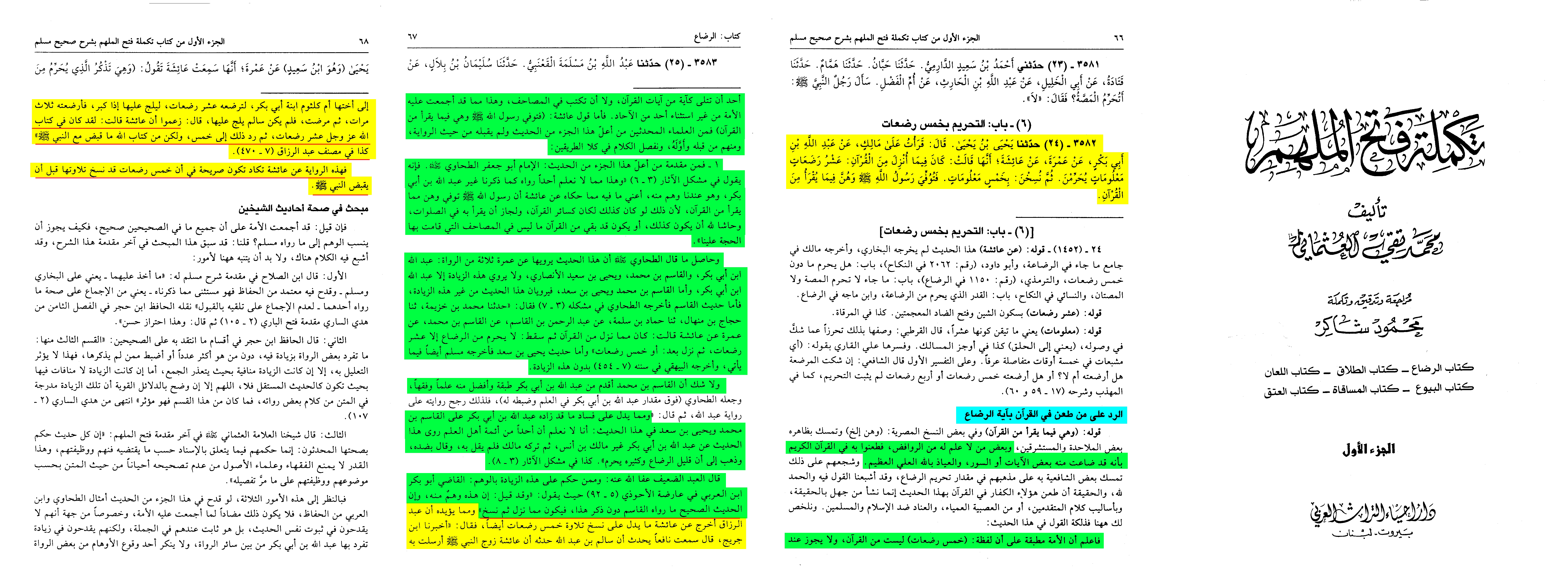 More of the translation⤵️
As for the Hadīth of Qāsim, al-Tahāwī has recorded in his "Mushkil"... that 'Ā'ishah said: "It was part of what
was revealed in the Qur'ān, that marriage does not become prohibited except by 10 breastfeedings,
then it was revealed except by 5 breastfeedings." As for the Hadīth of Yahyā Ibn Sa'īd al Ansārī,
it has been recorded by Muslim as stated earlier, and also by al Bayhaqī in his Sunan without this addition.
And there is no doubt that Al Qāsim Ibn Muhammad has preceded 'Abdullāh Ibn Abī Bakr and is more knowledgeable
than him, and so al-Tahāwī said that he is greater than the latter in knowledge
by many degrees, and so he chose his narration over 'Abdullāh's. Then he (al-Tahāwī) said in "Mushkil al Āthār":
"And what also shows the inauthenticity of 'Abdullāh's addition compared to what Al Qāsim Ibn Muhammad and
Yahyā Ibn Sa'īd regarding this Hadīth is that we do not know of any of the scholars narrating it from
'Abdullāh except for Mālik Ibn Anas, who then rejected him and criticised him."
Additionally, from those who also said that this addition was an error is al Qādī Ibn al 'Arabī in
"Āridhah al Ahwadhī" who said:
"This is an error from him, and if the Hadīth was Sahīh, it would be what Qāsim narrated without this
[addition], that it was part of revelation and was later abrogated."
What also supports this is what 'Abd al-Razzāq recorded from 'Ā'ishah in his Musannaf regarding the abrogation
of the recitation [of the verses about] 5 breastfeedings... and so this narration from 'Ā'ishah shows that the
recitation [of the verses] about 5 breastfeedings was abrogated before the death of the Prophet ﷺ."
AISHA رضي الله عنها CLAIMS ALL 10 WERE ABROGATED
It was narrated that 'Aishah said:
“Once of the things that Allah revealed in the the Qur'an and then abrogated was that nothing makes marriage prohibited except
ten breastfeedings or five well-known (breastfeedings).”
More of the translation⤵️
As for the Hadīth of Qāsim, al-Tahāwī has recorded in his "Mushkil"... that 'Ā'ishah said: "It was part of what
was revealed in the Qur'ān, that marriage does not become prohibited except by 10 breastfeedings,
then it was revealed except by 5 breastfeedings." As for the Hadīth of Yahyā Ibn Sa'īd al Ansārī,
it has been recorded by Muslim as stated earlier, and also by al Bayhaqī in his Sunan without this addition.
And there is no doubt that Al Qāsim Ibn Muhammad has preceded 'Abdullāh Ibn Abī Bakr and is more knowledgeable
than him, and so al-Tahāwī said that he is greater than the latter in knowledge
by many degrees, and so he chose his narration over 'Abdullāh's. Then he (al-Tahāwī) said in "Mushkil al Āthār":
"And what also shows the inauthenticity of 'Abdullāh's addition compared to what Al Qāsim Ibn Muhammad and
Yahyā Ibn Sa'īd regarding this Hadīth is that we do not know of any of the scholars narrating it from
'Abdullāh except for Mālik Ibn Anas, who then rejected him and criticised him."
Additionally, from those who also said that this addition was an error is al Qādī Ibn al 'Arabī in
"Āridhah al Ahwadhī" who said:
"This is an error from him, and if the Hadīth was Sahīh, it would be what Qāsim narrated without this
[addition], that it was part of revelation and was later abrogated."
What also supports this is what 'Abd al-Razzāq recorded from 'Ā'ishah in his Musannaf regarding the abrogation
of the recitation [of the verses about] 5 breastfeedings... and so this narration from 'Ā'ishah shows that the
recitation [of the verses] about 5 breastfeedings was abrogated before the death of the Prophet ﷺ."
AISHA رضي الله عنها CLAIMS ALL 10 WERE ABROGATED
It was narrated that 'Aishah said:
“Once of the things that Allah revealed in the the Qur'an and then abrogated was that nothing makes marriage prohibited except
ten breastfeedings or five well-known (breastfeedings).”
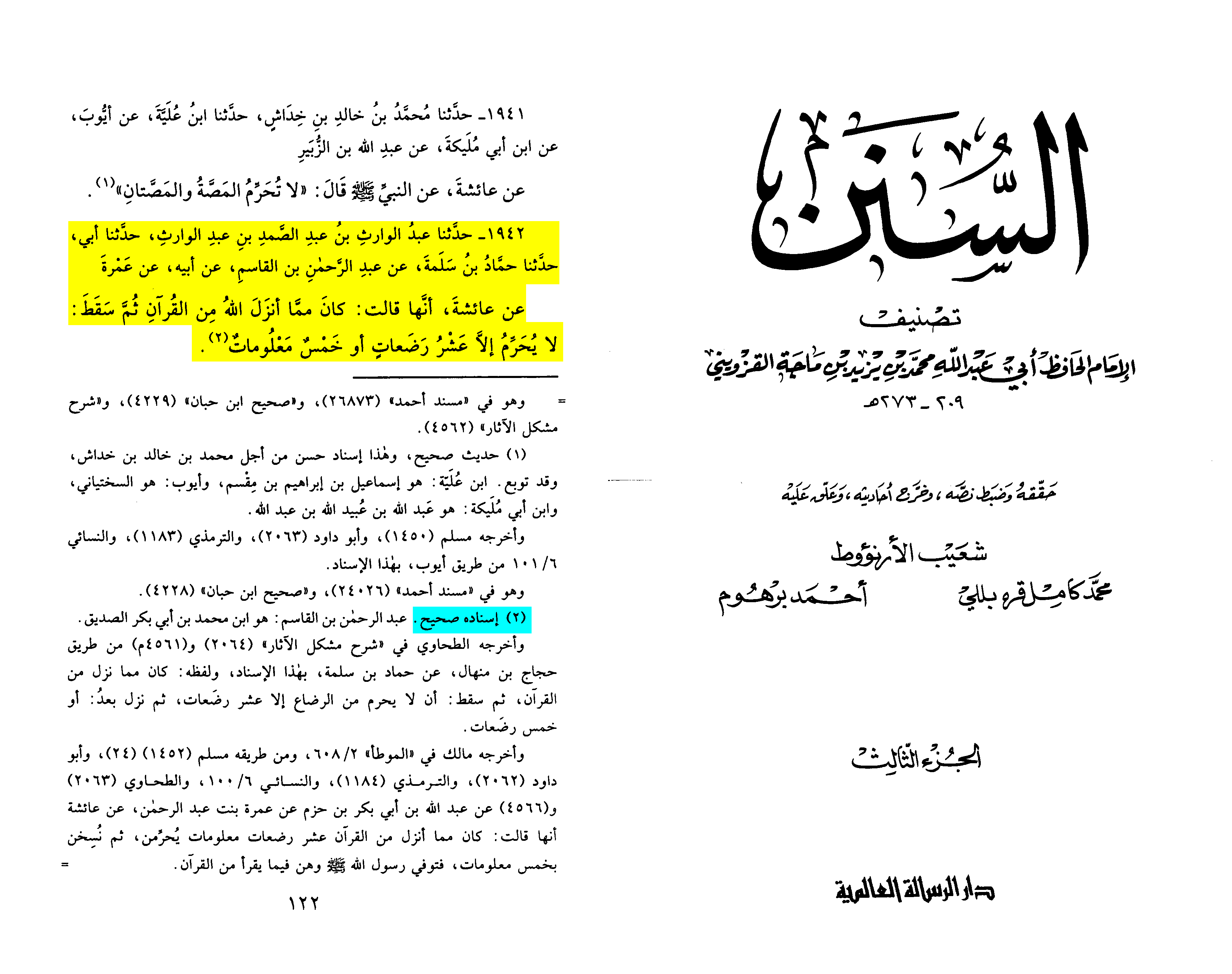 This narration in Mussanaf Abdul razaq Aisha رضي الله عنها says the same thing.
Ibn Juraij said: They held that ‘Aisha said, “Verily ten sucklings were mentioned in the Qur’an
(as proof of foster relations). Subsequently, it was changed to five sucklings. It was in the Book of Allah
but (the part of it that) was abrogated while the Prophet (ﷺ) was alive.”
This narration in Mussanaf Abdul razaq Aisha رضي الله عنها says the same thing.
Ibn Juraij said: They held that ‘Aisha said, “Verily ten sucklings were mentioned in the Qur’an
(as proof of foster relations). Subsequently, it was changed to five sucklings. It was in the Book of Allah
but (the part of it that) was abrogated while the Prophet (ﷺ) was alive.”
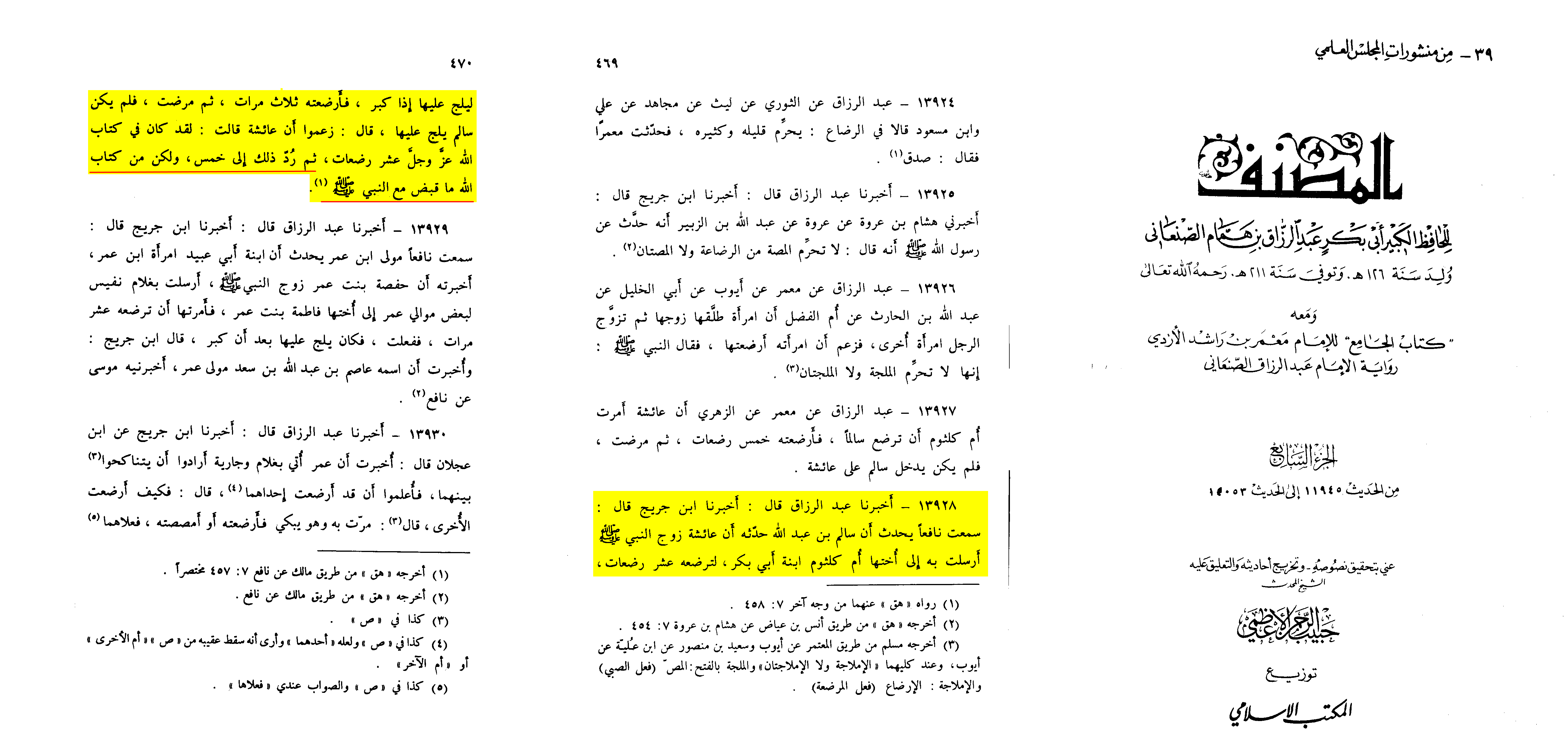 Narration 13914:
"The Wives of the Holy Prophet (pbuh) held that a specific number of breastfeeds prove the foster relation.'
He further said: 'Then this (opinion) was later left thus now little or
more suckling makes marriage unlawful."(establishes foster relation)
13916:
‘Abdul Karim informed me that he mentioned to Tawus: People say foster relation was not established except
if suckling had taken place seven times, and then it was changed to five. Tawus said: It used to be the case
but then it was ruled that even a single instance of suckling proved foster relation
13917:
Tawus said: a single a single suckling established foster relations (haram to marry)
Hence the verses of suckling were abrogated and 1 suckle = foster relationship, in other words haram for marriage
Narration 13914:
"The Wives of the Holy Prophet (pbuh) held that a specific number of breastfeeds prove the foster relation.'
He further said: 'Then this (opinion) was later left thus now little or
more suckling makes marriage unlawful."(establishes foster relation)
13916:
‘Abdul Karim informed me that he mentioned to Tawus: People say foster relation was not established except
if suckling had taken place seven times, and then it was changed to five. Tawus said: It used to be the case
but then it was ruled that even a single instance of suckling proved foster relation
13917:
Tawus said: a single a single suckling established foster relations (haram to marry)
Hence the verses of suckling were abrogated and 1 suckle = foster relationship, in other words haram for marriage
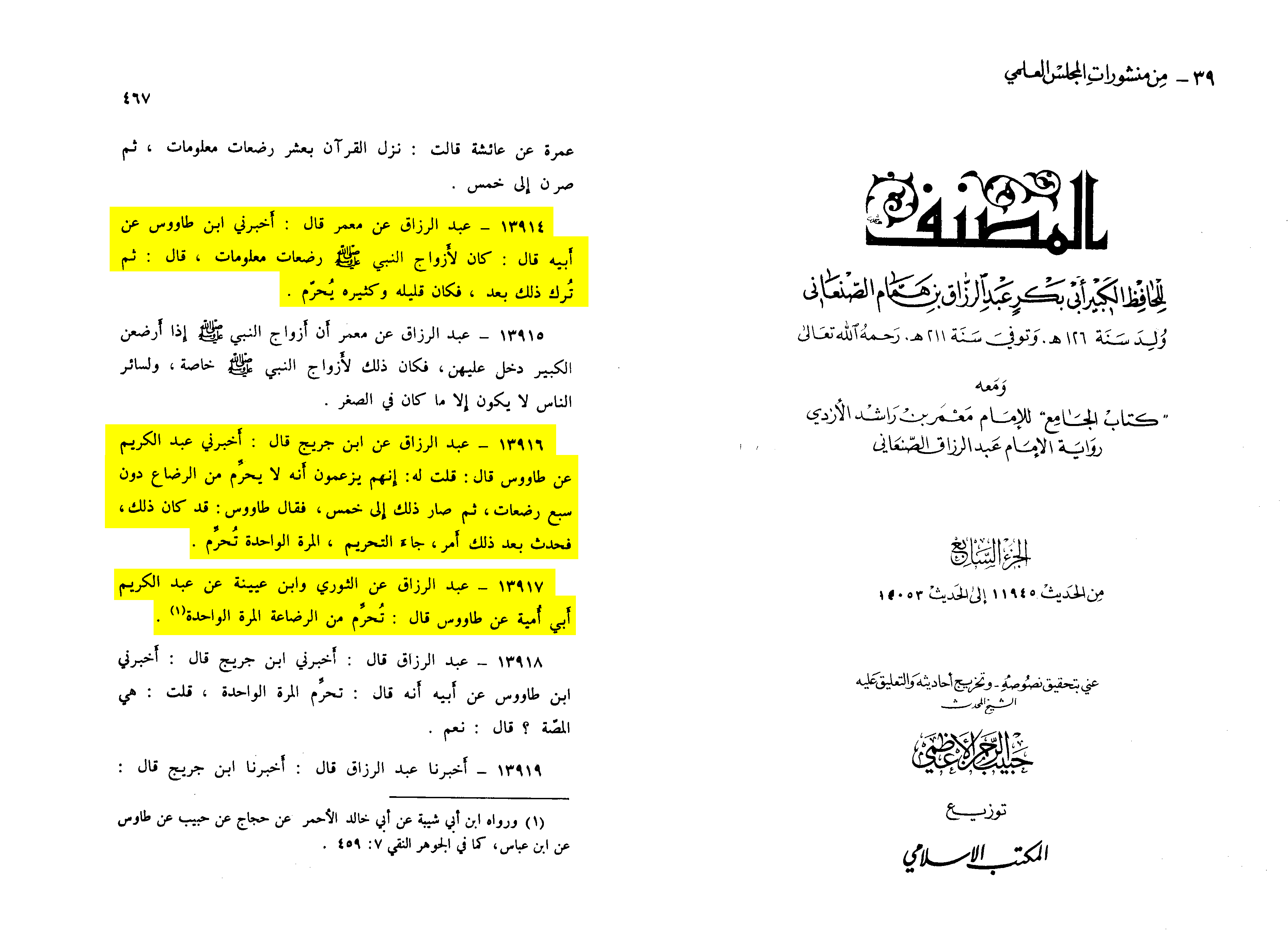 Tawus رحمه الله said:
At first ten sucklings was stipulated and then it was said that even a single a single suckling established
foster relations (i.e marriage unlawful)
Further proving it was abrogated.
Tawus رحمه الله said:
At first ten sucklings was stipulated and then it was said that even a single a single suckling established
foster relations (i.e marriage unlawful)
Further proving it was abrogated.
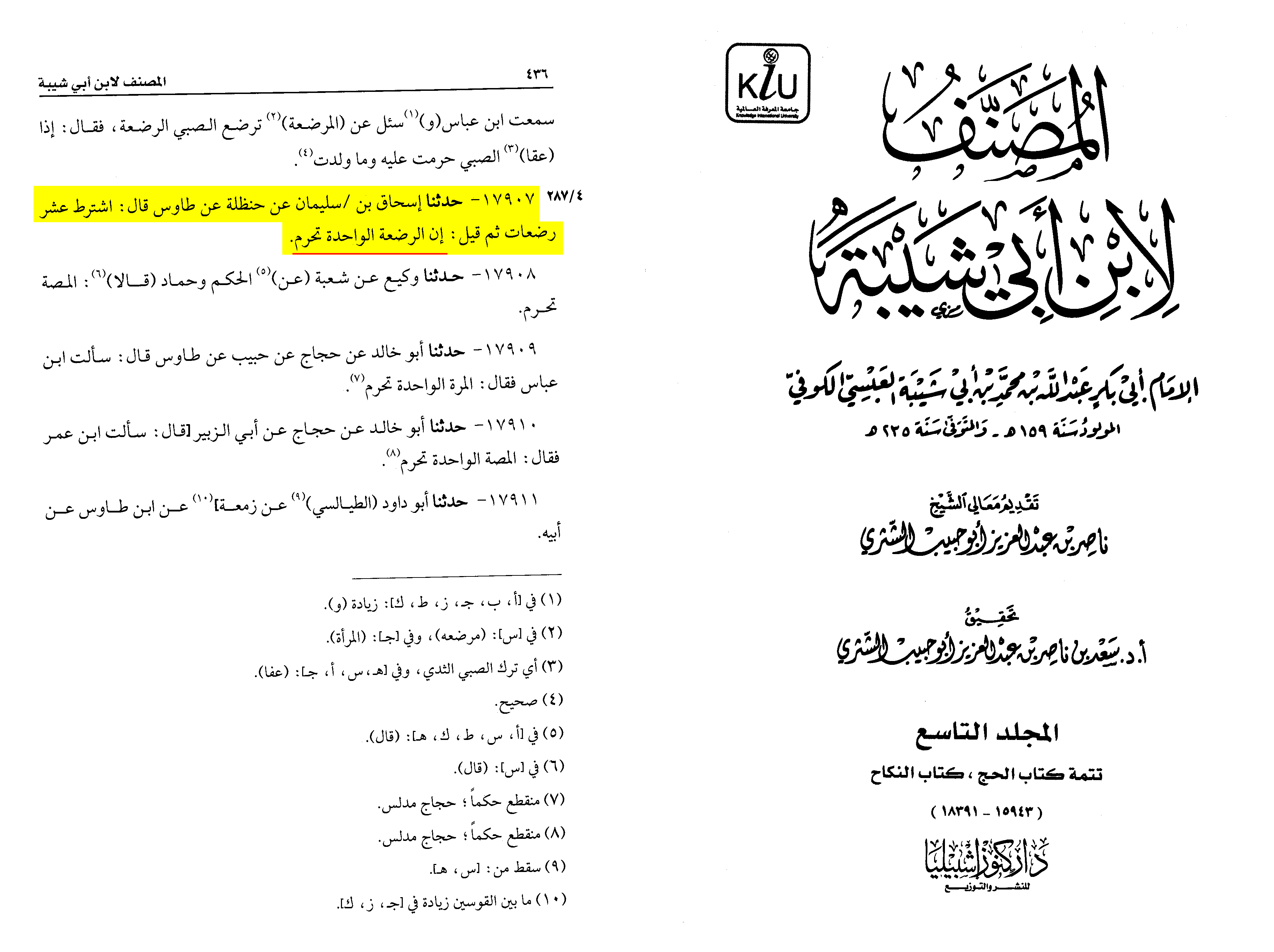 Tāwūs رحمه الله narrated from Ibn ‘Abbas saying the same thing. However the muhaqiq weakened it due to individuals in the chain.
Though it could be used a corroboration.
Tāwūs رحمه الله narrated from Ibn ‘Abbas saying the same thing. However the muhaqiq weakened it due to individuals in the chain.
Though it could be used a corroboration.
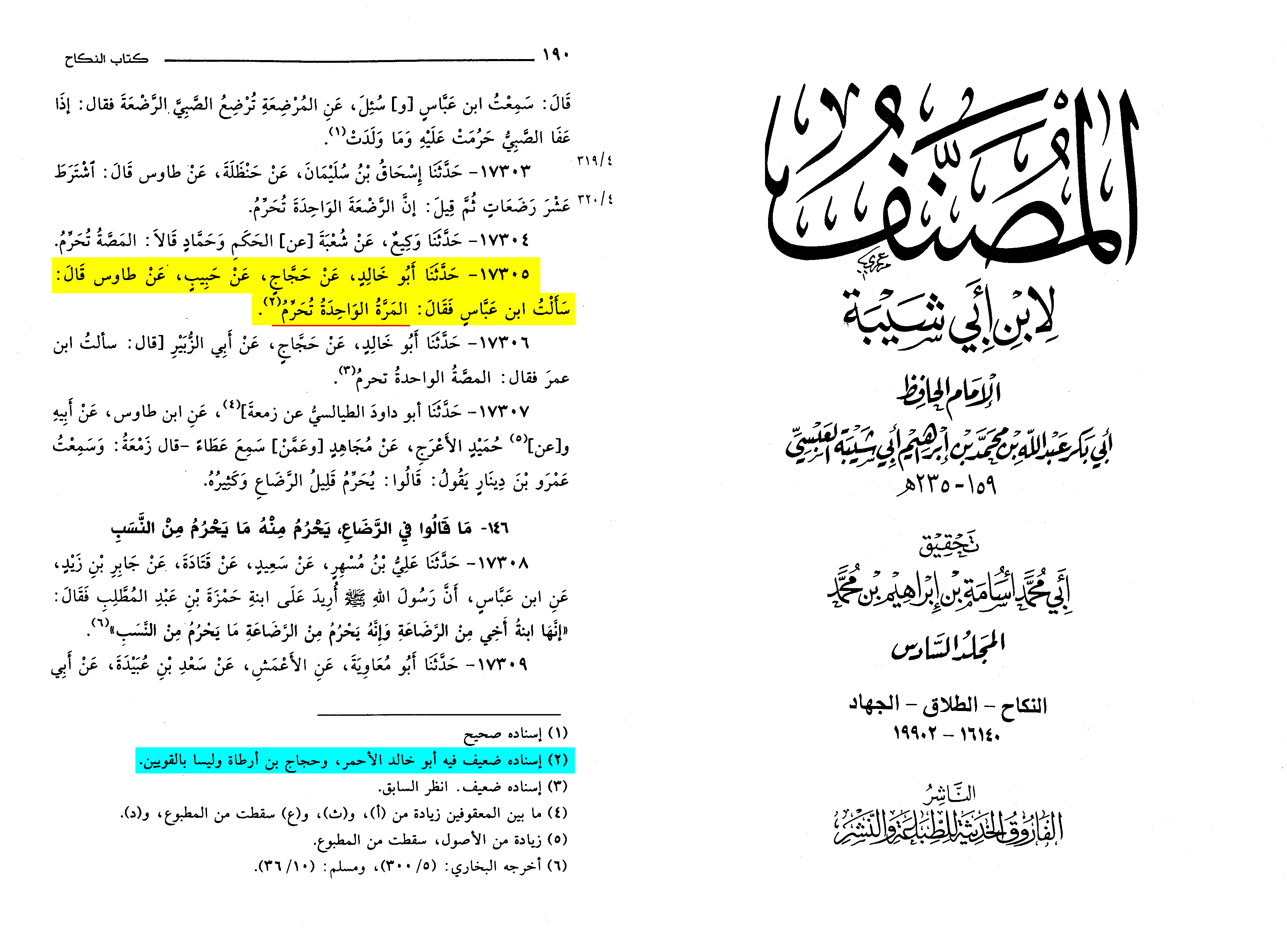 If a Shia decides to attack, their sources claim the same thing.
Al Tusi mentions in his book Al Tibyan fee tafseer al Quran. The concepts of abrogation and states the third
“what was abrogated from recitation and its ruling"
He quotes Aishas narration and says
"The verse and ruling was abrogated"
If a Shia decides to attack, their sources claim the same thing.
Al Tusi mentions in his book Al Tibyan fee tafseer al Quran. The concepts of abrogation and states the third
“what was abrogated from recitation and its ruling"
He quotes Aishas narration and says
"The verse and ruling was abrogated"
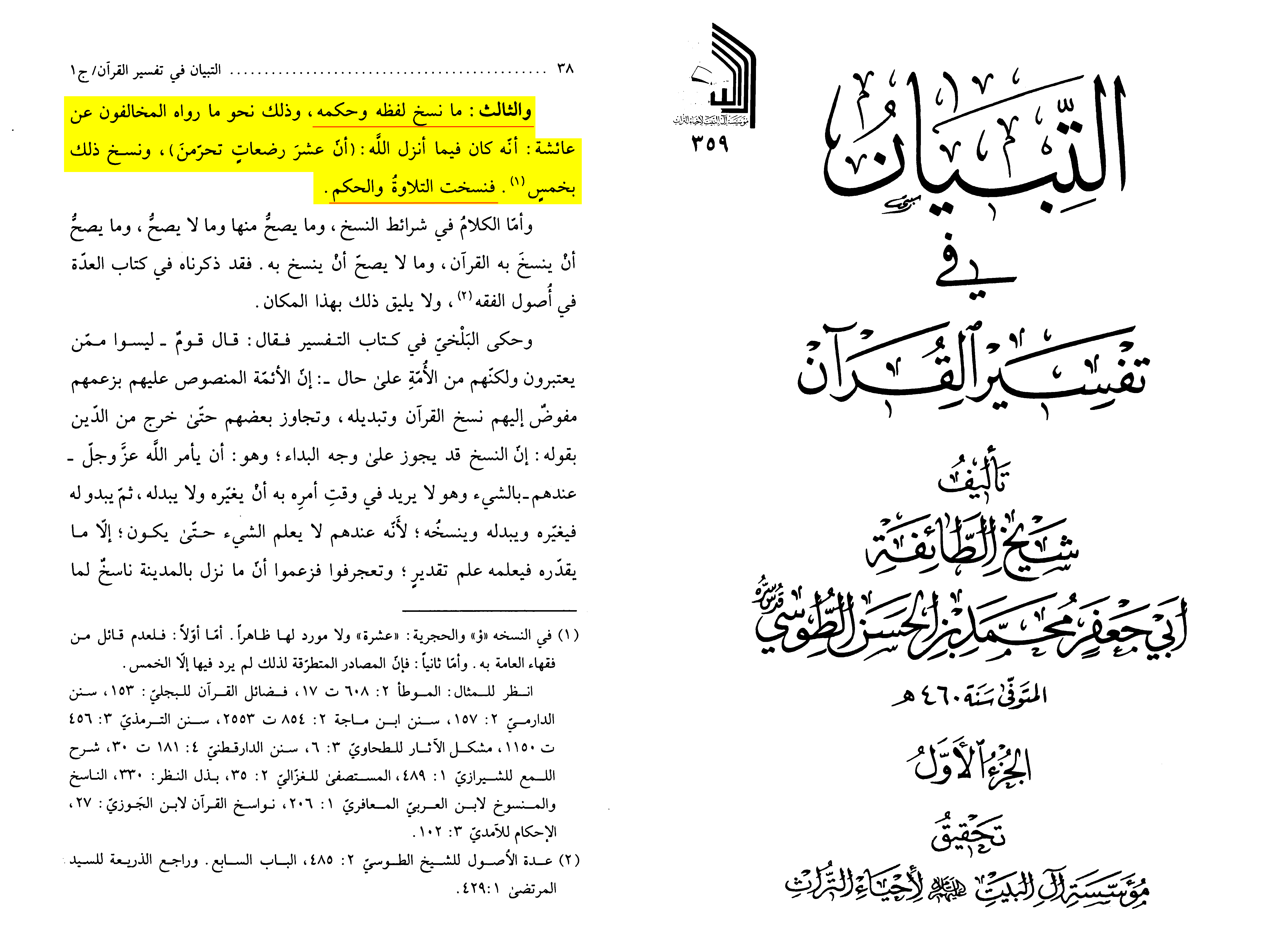 Al Tusi mentions in his book al ‘ida fee usool al fiqh
On 516 he mentions the stoning verse and states it was abrogated in recitation and remained in ruling.
The Muhaqiq Muhammad Rida Al Ansari al Qummi says "The hadith of the stoning verse was abrogated in recitation
and remained in ruling and both the Shia and the Sunnis have narrated it in their books”
On the next page al Tusi mentions the suckling verses and quotes Aishas narration and finally states thats its
abrogated in both recitation and abrogation.
Al Tusi mentions in his book al ‘ida fee usool al fiqh
On 516 he mentions the stoning verse and states it was abrogated in recitation and remained in ruling.
The Muhaqiq Muhammad Rida Al Ansari al Qummi says "The hadith of the stoning verse was abrogated in recitation
and remained in ruling and both the Shia and the Sunnis have narrated it in their books”
On the next page al Tusi mentions the suckling verses and quotes Aishas narration and finally states thats its
abrogated in both recitation and abrogation.
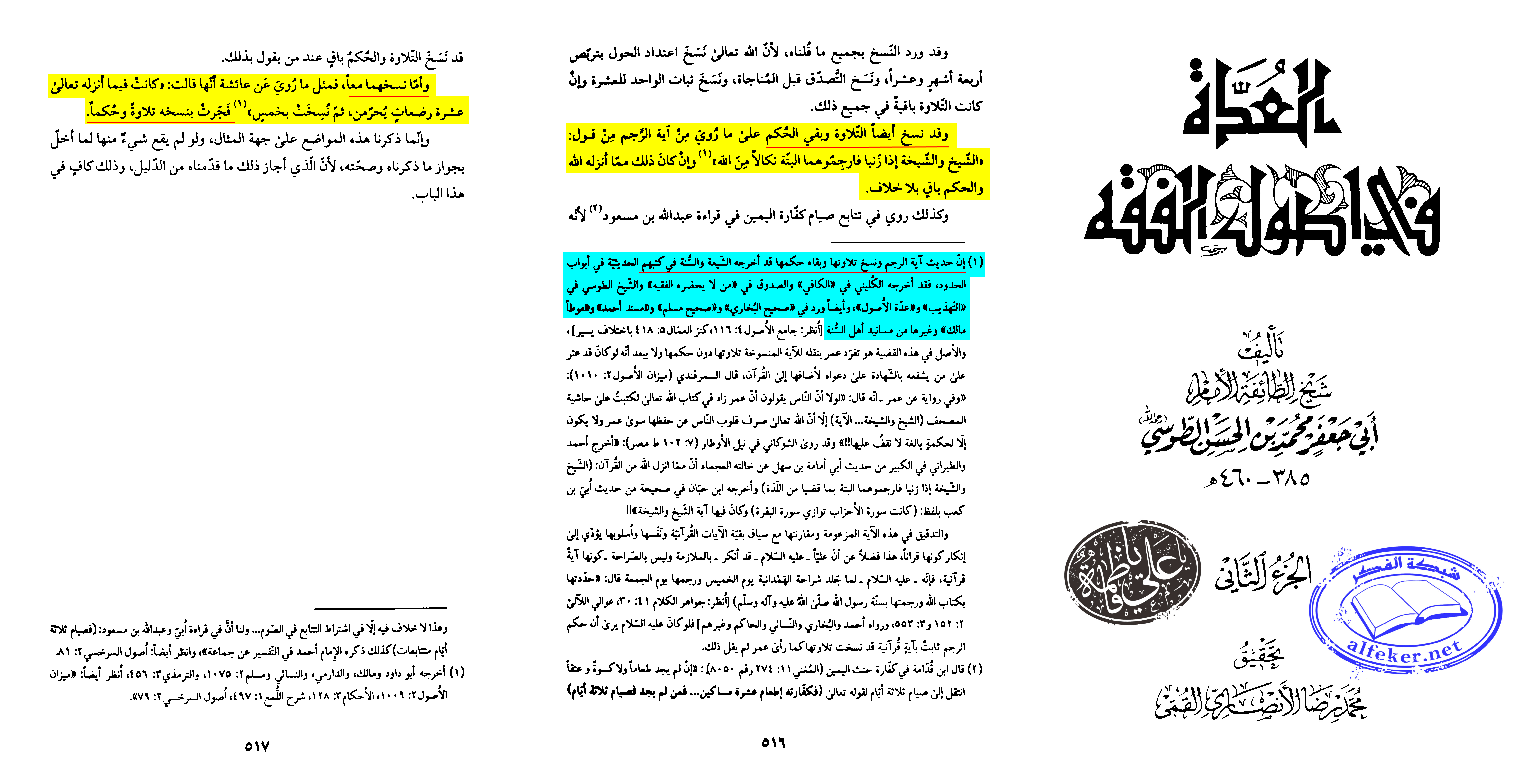 Muhammad Ali Al-Ashayqr
States the 3 forms of abrogation.
The 2nd form he mentioned is the abrogation of recitation whilst the ruling remains and says the stoning verses
falls under this. The 3rd form he mentions is both ruling and recitation abrogated and says the the narration of
Aisha رضي الله عنها with regards to suckling verses falls under this.
Muhammad Ali Al-Ashayqr
States the 3 forms of abrogation.
The 2nd form he mentioned is the abrogation of recitation whilst the ruling remains and says the stoning verses
falls under this. The 3rd form he mentions is both ruling and recitation abrogated and says the the narration of
Aisha رضي الله عنها with regards to suckling verses falls under this.
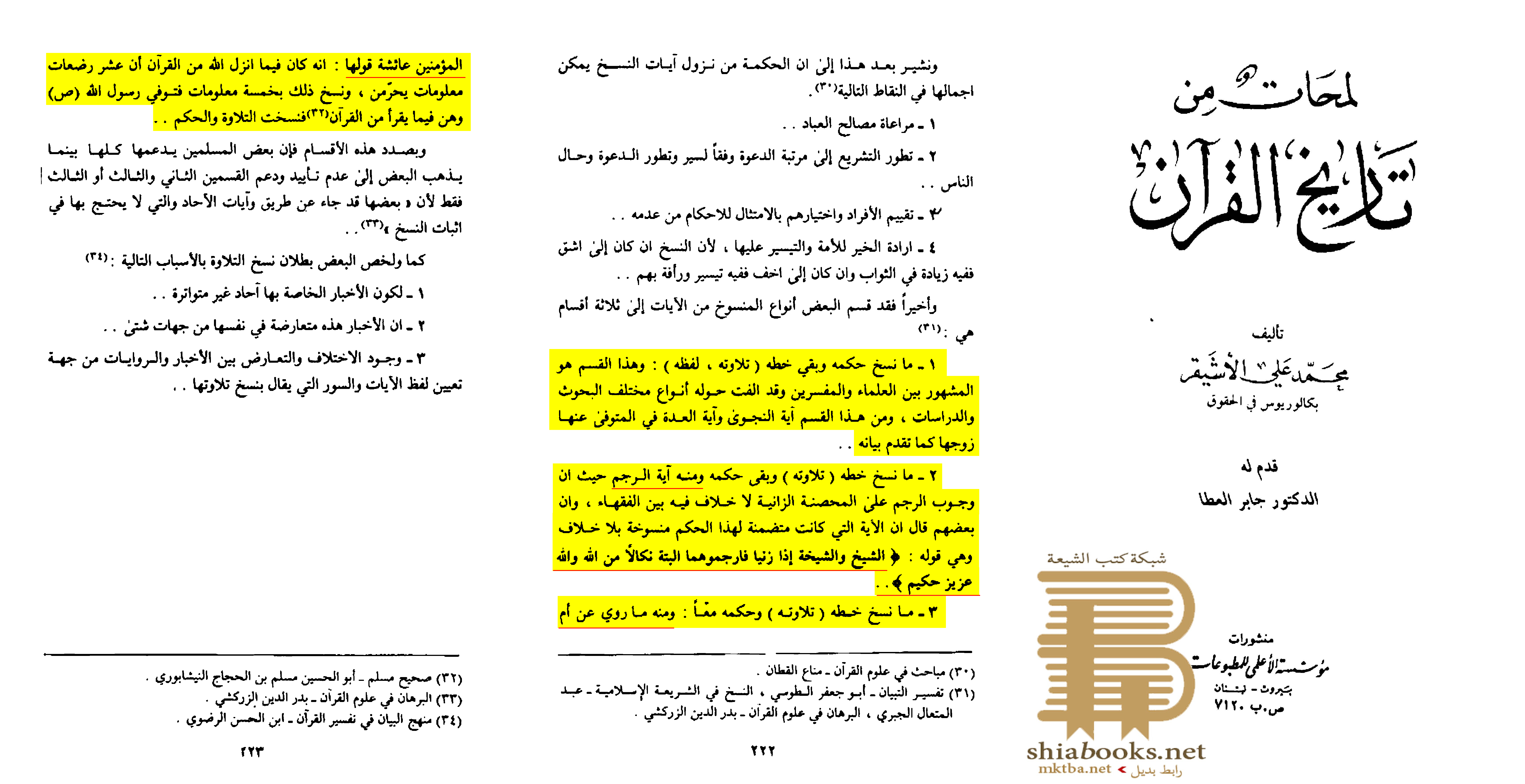 Shaykh al-Tarihi in his books Majma’ al-bahrayn says the same thing. The stoning verse is abrogated in recitation,
whilst the ruling remains, as for suckling both ruling and recitation are abrogated.
Shaykh al-Tarihi in his books Majma’ al-bahrayn says the same thing. The stoning verse is abrogated in recitation,
whilst the ruling remains, as for suckling both ruling and recitation are abrogated.
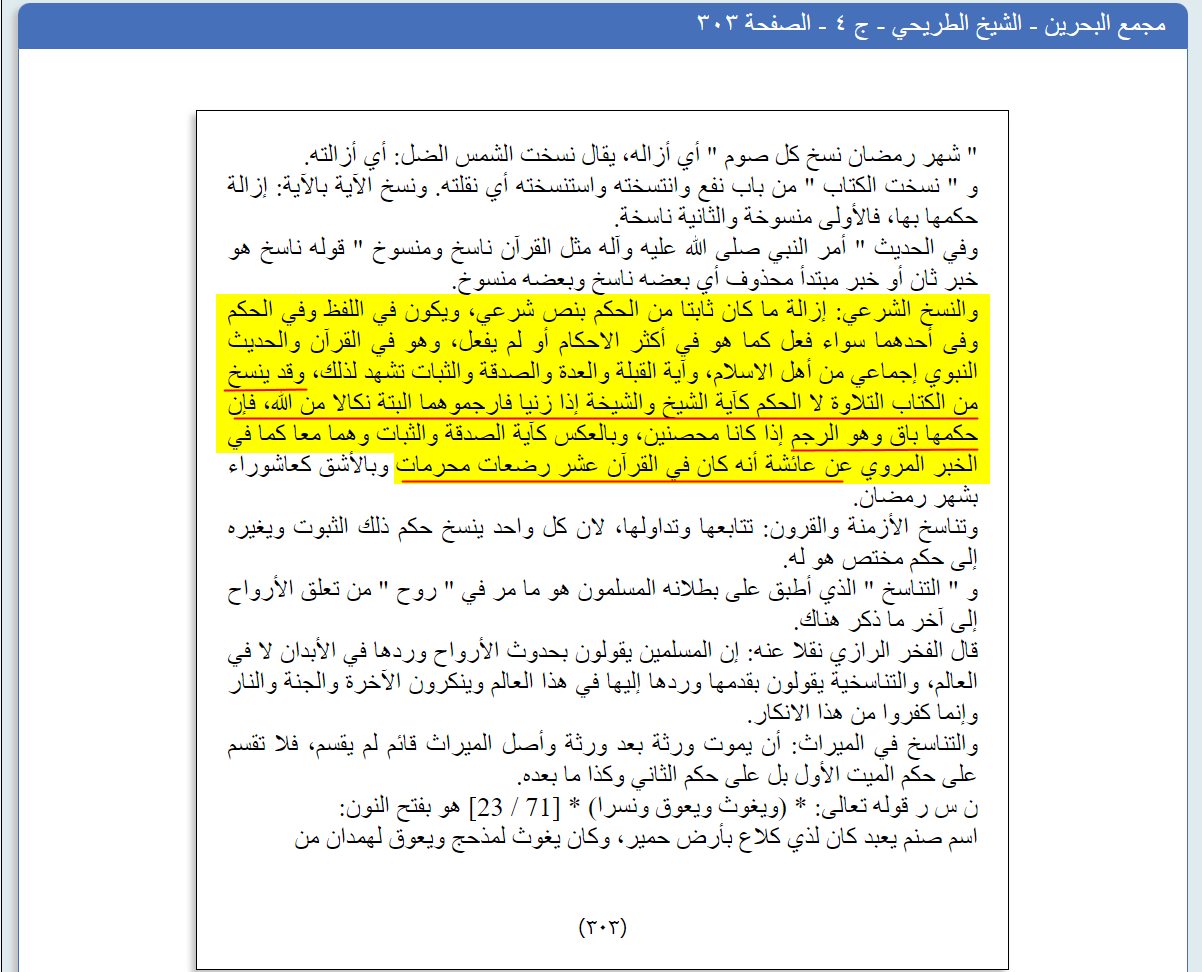
 Shaykh Abd al-Aziz al-Rajihi says:
Some of the people used to the 5 suckling (verses) and they were never informed of its abrogation,
when it was told to them they retracted from reciting and agreed in consensus that it should not be recited,
and this is the abrogation of recitation without the ruling (ruling remains) it is from one of the forms of
abrogation.
Shaykh Abd al-Aziz al-Rajihi says:
Some of the people used to the 5 suckling (verses) and they were never informed of its abrogation,
when it was told to them they retracted from reciting and agreed in consensus that it should not be recited,
and this is the abrogation of recitation without the ruling (ruling remains) it is from one of the forms of
abrogation.
 al-Hafidh al-Nawawi essentially says the same thing. He says the three forms of abrogation are
1) Recition abrogated without the ruling
2) ruling abrogation without the recitation
3) Both recitation and ruling are abrogated
He says the suckling verses fall under # 3 and the stoning verse falls under #1
al-Hafidh al-Nawawi essentially says the same thing. He says the three forms of abrogation are
1) Recition abrogated without the ruling
2) ruling abrogation without the recitation
3) Both recitation and ruling are abrogated
He says the suckling verses fall under # 3 and the stoning verse falls under #1
 "As for the statement {5 known ones (breastfeedings)]... and {And it was from what was recited [of the Qur'ān]},
if taken upon its apparent would suggest the Qur'ān is corrupted, so the explanation for it is that its recitation
was also abrogated but this happened near his death, ﷺ, so some of the people still recited it until after he passed
away, ﷺ, and then they stopped reciting it after [news of its abrogation] reached them. So it is clear that both
recitations have been abrogated, with some difference of opinion over the ruling of 5 breastfeedings remaining,
with the majority saying otherwise since
that which is abrogated is not to be used as evidence as it is not from the Qur'ān, nor Sunnah, scholarly consensus
or qiyās..."
"As for the statement {5 known ones (breastfeedings)]... and {And it was from what was recited [of the Qur'ān]},
if taken upon its apparent would suggest the Qur'ān is corrupted, so the explanation for it is that its recitation
was also abrogated but this happened near his death, ﷺ, so some of the people still recited it until after he passed
away, ﷺ, and then they stopped reciting it after [news of its abrogation] reached them. So it is clear that both
recitations have been abrogated, with some difference of opinion over the ruling of 5 breastfeedings remaining,
with the majority saying otherwise since
that which is abrogated is not to be used as evidence as it is not from the Qur'ān, nor Sunnah, scholarly consensus
or qiyās..."
 "The explanation of this is that it was recited by some people as they were not aware of its abrogation...
al-Tawrabishtī said:
It is not correct to say that its recitation still remained [as part of the Qur'ān] and then it was abandoned
since Allāh has protected this book from any form of corruption due to the verse (Qur'ān 15:9). It is not possible
for Allāh's Book to be missing a verse, or even a letter, from the time of the Message except that it was abrogated."
"The explanation of this is that it was recited by some people as they were not aware of its abrogation...
al-Tawrabishtī said:
It is not correct to say that its recitation still remained [as part of the Qur'ān] and then it was abandoned
since Allāh has protected this book from any form of corruption due to the verse (Qur'ān 15:9). It is not possible
for Allāh's Book to be missing a verse, or even a letter, from the time of the Message except that it was abrogated."
 "In the Hadīth there is evidence that there are two types of abrogation, in ruling and recitation,
and in just recitation and not ruling. As for abrogation in ruling and recitation, then that is shown in the statement of
'Ā'ishah {10 breastfeedings making marriage prohibited was part of what was revealed in the Qur'ān}. The [ruling] of 10 breastfeedings
was abrogated in recitation and ruling. As for abrogation in recitation without ruling, then that is in her statement {Then it was abrogated by 5}.
So this statement was abrogated in recitation, and many of the scholars affirmed
[the validity] of the ruling, such as ash-Shāfi'ī, and it is one of the statements of Imām Ahmad and what his companions acted upon.
And so the verse is abrogated, but the ruling remains, and that is [the] correct [view], God-willing....
Abū Bakr al Bāqillānī said:
"The people knew that these words and recitations that were not included in the Mushaf of 'Uthmān were abrogated..."
And some scholars saw the statement of 'Ā'ishah as problematic... while in reality, it is not so. The scholars
have the following opinions regarding it:
1) That it was from what was recited of the Qur'ān close to his death, ﷺ
2) The ruling was what was "recited" (or mentioned) without its wording [being present in the Qur'ān]
3) Its recitation was abrogated, and not everyone from among the people knew of this until after the death of Allāh's
Messenger ﷺ, and so he ﷺ died and some still recited it
4) That what was recited is in reference to the verse (Qur'ān 4:22)
And there is no doubt that the most correct view is the third, and God knows best. With this settled, then there is no
problem in the meaning of the Hadīth, and to Allāh belongs all praise...
And it has been narrated in some chains with of the Hadīth with an odd, weak wording which came from Ibn Ishāq
[Sunan Ibn Mājah 1944, Musnad Ahmad 26316)"
"In the Hadīth there is evidence that there are two types of abrogation, in ruling and recitation,
and in just recitation and not ruling. As for abrogation in ruling and recitation, then that is shown in the statement of
'Ā'ishah {10 breastfeedings making marriage prohibited was part of what was revealed in the Qur'ān}. The [ruling] of 10 breastfeedings
was abrogated in recitation and ruling. As for abrogation in recitation without ruling, then that is in her statement {Then it was abrogated by 5}.
So this statement was abrogated in recitation, and many of the scholars affirmed
[the validity] of the ruling, such as ash-Shāfi'ī, and it is one of the statements of Imām Ahmad and what his companions acted upon.
And so the verse is abrogated, but the ruling remains, and that is [the] correct [view], God-willing....
Abū Bakr al Bāqillānī said:
"The people knew that these words and recitations that were not included in the Mushaf of 'Uthmān were abrogated..."
And some scholars saw the statement of 'Ā'ishah as problematic... while in reality, it is not so. The scholars
have the following opinions regarding it:
1) That it was from what was recited of the Qur'ān close to his death, ﷺ
2) The ruling was what was "recited" (or mentioned) without its wording [being present in the Qur'ān]
3) Its recitation was abrogated, and not everyone from among the people knew of this until after the death of Allāh's
Messenger ﷺ, and so he ﷺ died and some still recited it
4) That what was recited is in reference to the verse (Qur'ān 4:22)
And there is no doubt that the most correct view is the third, and God knows best. With this settled, then there is no
problem in the meaning of the Hadīth, and to Allāh belongs all praise...
And it has been narrated in some chains with of the Hadīth with an odd, weak wording which came from Ibn Ishāq
[Sunan Ibn Mājah 1944, Musnad Ahmad 26316)"
 "As for the statement {And it was from what was recited from the Qur'ān}... some atheists and ignorant Rawāfidh
have taken it upon its apparent and attacked the Qur'ān and said that it is missing some verses and chapters,
and we seek refuge in Allāh the Most High and Great [from such]... and the reality is that this slander of these
disbelievers against the Qur'ān by using this Hadīth is based upon ignorance.
The Ummah have agreed that the wording {Five breastfeedings} is not from the Qur'ān and that it is not permitted
for anyone to recite that like the Qur'ān or to write it down in the Masāhif, this agreement having not been opposed
by anyone. As for 'Ā'ishah's statement {When Allāh's Messenger ﷺ died it was from what was recited from the Qur'ān},
many of the scholars of Hadīth weakened this part and didn't accept it, and there were some who accepted it and explained it.
From those who weakened this part of the Hadīth was Imām Abū Ja'far al-Tahāwī who stated in "Mushkil al Āthār":
"And we do not know of anyone other than 'Abdullāh Ibn Abī Bakr narrating this, and he has erred in our view
regarding what he has narrated from 'Ā'ishah that Allāh's Messenger ﷺ died and it was from what was recited from
the Qur'ān, because if this were the case then it would be like the rest of the Qur'ān and be recited in the prayers
[of Muslims]. Sublime is Allāh that this could be the case, or that there would remain some of the Qur'ān that was not present in the Masāhif."
And it is as stated by al-Tahāwī, that this Hadīth has been narrated from 'Amrah by three: 'Abdullāh Ibn Abī Bakr,
Al Qāsim Ibn Muhammad and Yahyā Ibn Sa'īd al Ansārī. Nobody narrated this addition except for 'Abdullāh Ibn Abī Bakr,
and Qāsim and Yahyā Ibn Sa'īd narrated it without this addition.
"As for the statement {And it was from what was recited from the Qur'ān}... some atheists and ignorant Rawāfidh
have taken it upon its apparent and attacked the Qur'ān and said that it is missing some verses and chapters,
and we seek refuge in Allāh the Most High and Great [from such]... and the reality is that this slander of these
disbelievers against the Qur'ān by using this Hadīth is based upon ignorance.
The Ummah have agreed that the wording {Five breastfeedings} is not from the Qur'ān and that it is not permitted
for anyone to recite that like the Qur'ān or to write it down in the Masāhif, this agreement having not been opposed
by anyone. As for 'Ā'ishah's statement {When Allāh's Messenger ﷺ died it was from what was recited from the Qur'ān},
many of the scholars of Hadīth weakened this part and didn't accept it, and there were some who accepted it and explained it.
From those who weakened this part of the Hadīth was Imām Abū Ja'far al-Tahāwī who stated in "Mushkil al Āthār":
"And we do not know of anyone other than 'Abdullāh Ibn Abī Bakr narrating this, and he has erred in our view
regarding what he has narrated from 'Ā'ishah that Allāh's Messenger ﷺ died and it was from what was recited from
the Qur'ān, because if this were the case then it would be like the rest of the Qur'ān and be recited in the prayers
[of Muslims]. Sublime is Allāh that this could be the case, or that there would remain some of the Qur'ān that was not present in the Masāhif."
And it is as stated by al-Tahāwī, that this Hadīth has been narrated from 'Amrah by three: 'Abdullāh Ibn Abī Bakr,
Al Qāsim Ibn Muhammad and Yahyā Ibn Sa'īd al Ansārī. Nobody narrated this addition except for 'Abdullāh Ibn Abī Bakr,
and Qāsim and Yahyā Ibn Sa'īd narrated it without this addition.
 More of the translation⤵️
As for the Hadīth of Qāsim, al-Tahāwī has recorded in his "Mushkil"... that 'Ā'ishah said: "It was part of what
was revealed in the Qur'ān, that marriage does not become prohibited except by 10 breastfeedings,
then it was revealed except by 5 breastfeedings." As for the Hadīth of Yahyā Ibn Sa'īd al Ansārī,
it has been recorded by Muslim as stated earlier, and also by al Bayhaqī in his Sunan without this addition.
And there is no doubt that Al Qāsim Ibn Muhammad has preceded 'Abdullāh Ibn Abī Bakr and is more knowledgeable
than him, and so al-Tahāwī said that he is greater than the latter in knowledge
by many degrees, and so he chose his narration over 'Abdullāh's. Then he (al-Tahāwī) said in "Mushkil al Āthār":
"And what also shows the inauthenticity of 'Abdullāh's addition compared to what Al Qāsim Ibn Muhammad and
Yahyā Ibn Sa'īd regarding this Hadīth is that we do not know of any of the scholars narrating it from
'Abdullāh except for Mālik Ibn Anas, who then rejected him and criticised him."
Additionally, from those who also said that this addition was an error is al Qādī Ibn al 'Arabī in
"Āridhah al Ahwadhī" who said:
"This is an error from him, and if the Hadīth was Sahīh, it would be what Qāsim narrated without this
[addition], that it was part of revelation and was later abrogated."
What also supports this is what 'Abd al-Razzāq recorded from 'Ā'ishah in his Musannaf regarding the abrogation
of the recitation [of the verses about] 5 breastfeedings... and so this narration from 'Ā'ishah shows that the
recitation [of the verses] about 5 breastfeedings was abrogated before the death of the Prophet ﷺ."
AISHA رضي الله عنها CLAIMS ALL 10 WERE ABROGATED
It was narrated that 'Aishah said:
“Once of the things that Allah revealed in the the Qur'an and then abrogated was that nothing makes marriage prohibited except
ten breastfeedings or five well-known (breastfeedings).”
More of the translation⤵️
As for the Hadīth of Qāsim, al-Tahāwī has recorded in his "Mushkil"... that 'Ā'ishah said: "It was part of what
was revealed in the Qur'ān, that marriage does not become prohibited except by 10 breastfeedings,
then it was revealed except by 5 breastfeedings." As for the Hadīth of Yahyā Ibn Sa'īd al Ansārī,
it has been recorded by Muslim as stated earlier, and also by al Bayhaqī in his Sunan without this addition.
And there is no doubt that Al Qāsim Ibn Muhammad has preceded 'Abdullāh Ibn Abī Bakr and is more knowledgeable
than him, and so al-Tahāwī said that he is greater than the latter in knowledge
by many degrees, and so he chose his narration over 'Abdullāh's. Then he (al-Tahāwī) said in "Mushkil al Āthār":
"And what also shows the inauthenticity of 'Abdullāh's addition compared to what Al Qāsim Ibn Muhammad and
Yahyā Ibn Sa'īd regarding this Hadīth is that we do not know of any of the scholars narrating it from
'Abdullāh except for Mālik Ibn Anas, who then rejected him and criticised him."
Additionally, from those who also said that this addition was an error is al Qādī Ibn al 'Arabī in
"Āridhah al Ahwadhī" who said:
"This is an error from him, and if the Hadīth was Sahīh, it would be what Qāsim narrated without this
[addition], that it was part of revelation and was later abrogated."
What also supports this is what 'Abd al-Razzāq recorded from 'Ā'ishah in his Musannaf regarding the abrogation
of the recitation [of the verses about] 5 breastfeedings... and so this narration from 'Ā'ishah shows that the
recitation [of the verses] about 5 breastfeedings was abrogated before the death of the Prophet ﷺ."
AISHA رضي الله عنها CLAIMS ALL 10 WERE ABROGATED
It was narrated that 'Aishah said:
“Once of the things that Allah revealed in the the Qur'an and then abrogated was that nothing makes marriage prohibited except
ten breastfeedings or five well-known (breastfeedings).”
 This narration in Mussanaf Abdul razaq Aisha رضي الله عنها says the same thing.
Ibn Juraij said: They held that ‘Aisha said, “Verily ten sucklings were mentioned in the Qur’an
(as proof of foster relations). Subsequently, it was changed to five sucklings. It was in the Book of Allah
but (the part of it that) was abrogated while the Prophet (ﷺ) was alive.”
This narration in Mussanaf Abdul razaq Aisha رضي الله عنها says the same thing.
Ibn Juraij said: They held that ‘Aisha said, “Verily ten sucklings were mentioned in the Qur’an
(as proof of foster relations). Subsequently, it was changed to five sucklings. It was in the Book of Allah
but (the part of it that) was abrogated while the Prophet (ﷺ) was alive.”
 Narration 13914:
"The Wives of the Holy Prophet (pbuh) held that a specific number of breastfeeds prove the foster relation.'
He further said: 'Then this (opinion) was later left thus now little or
more suckling makes marriage unlawful."(establishes foster relation)
13916:
‘Abdul Karim informed me that he mentioned to Tawus: People say foster relation was not established except
if suckling had taken place seven times, and then it was changed to five. Tawus said: It used to be the case
but then it was ruled that even a single instance of suckling proved foster relation
13917:
Tawus said: a single a single suckling established foster relations (haram to marry)
Hence the verses of suckling were abrogated and 1 suckle = foster relationship, in other words haram for marriage
Narration 13914:
"The Wives of the Holy Prophet (pbuh) held that a specific number of breastfeeds prove the foster relation.'
He further said: 'Then this (opinion) was later left thus now little or
more suckling makes marriage unlawful."(establishes foster relation)
13916:
‘Abdul Karim informed me that he mentioned to Tawus: People say foster relation was not established except
if suckling had taken place seven times, and then it was changed to five. Tawus said: It used to be the case
but then it was ruled that even a single instance of suckling proved foster relation
13917:
Tawus said: a single a single suckling established foster relations (haram to marry)
Hence the verses of suckling were abrogated and 1 suckle = foster relationship, in other words haram for marriage
 Tawus رحمه الله said:
At first ten sucklings was stipulated and then it was said that even a single a single suckling established
foster relations (i.e marriage unlawful)
Further proving it was abrogated.
Tawus رحمه الله said:
At first ten sucklings was stipulated and then it was said that even a single a single suckling established
foster relations (i.e marriage unlawful)
Further proving it was abrogated.
 Tāwūs رحمه الله narrated from Ibn ‘Abbas saying the same thing. However the muhaqiq weakened it due to individuals in the chain.
Though it could be used a corroboration.
Tāwūs رحمه الله narrated from Ibn ‘Abbas saying the same thing. However the muhaqiq weakened it due to individuals in the chain.
Though it could be used a corroboration.
 If a Shia decides to attack, their sources claim the same thing.
Al Tusi mentions in his book Al Tibyan fee tafseer al Quran. The concepts of abrogation and states the third
“what was abrogated from recitation and its ruling"
He quotes Aishas narration and says
"The verse and ruling was abrogated"
If a Shia decides to attack, their sources claim the same thing.
Al Tusi mentions in his book Al Tibyan fee tafseer al Quran. The concepts of abrogation and states the third
“what was abrogated from recitation and its ruling"
He quotes Aishas narration and says
"The verse and ruling was abrogated"
 Al Tusi mentions in his book al ‘ida fee usool al fiqh
On 516 he mentions the stoning verse and states it was abrogated in recitation and remained in ruling.
The Muhaqiq Muhammad Rida Al Ansari al Qummi says "The hadith of the stoning verse was abrogated in recitation
and remained in ruling and both the Shia and the Sunnis have narrated it in their books”
On the next page al Tusi mentions the suckling verses and quotes Aishas narration and finally states thats its
abrogated in both recitation and abrogation.
Al Tusi mentions in his book al ‘ida fee usool al fiqh
On 516 he mentions the stoning verse and states it was abrogated in recitation and remained in ruling.
The Muhaqiq Muhammad Rida Al Ansari al Qummi says "The hadith of the stoning verse was abrogated in recitation
and remained in ruling and both the Shia and the Sunnis have narrated it in their books”
On the next page al Tusi mentions the suckling verses and quotes Aishas narration and finally states thats its
abrogated in both recitation and abrogation.
 Muhammad Ali Al-Ashayqr
States the 3 forms of abrogation.
The 2nd form he mentioned is the abrogation of recitation whilst the ruling remains and says the stoning verses
falls under this. The 3rd form he mentions is both ruling and recitation abrogated and says the the narration of
Aisha رضي الله عنها with regards to suckling verses falls under this.
Muhammad Ali Al-Ashayqr
States the 3 forms of abrogation.
The 2nd form he mentioned is the abrogation of recitation whilst the ruling remains and says the stoning verses
falls under this. The 3rd form he mentions is both ruling and recitation abrogated and says the the narration of
Aisha رضي الله عنها with regards to suckling verses falls under this.
 Shaykh al-Tarihi in his books Majma’ al-bahrayn says the same thing. The stoning verse is abrogated in recitation,
whilst the ruling remains, as for suckling both ruling and recitation are abrogated.
Shaykh al-Tarihi in his books Majma’ al-bahrayn says the same thing. The stoning verse is abrogated in recitation,
whilst the ruling remains, as for suckling both ruling and recitation are abrogated.
